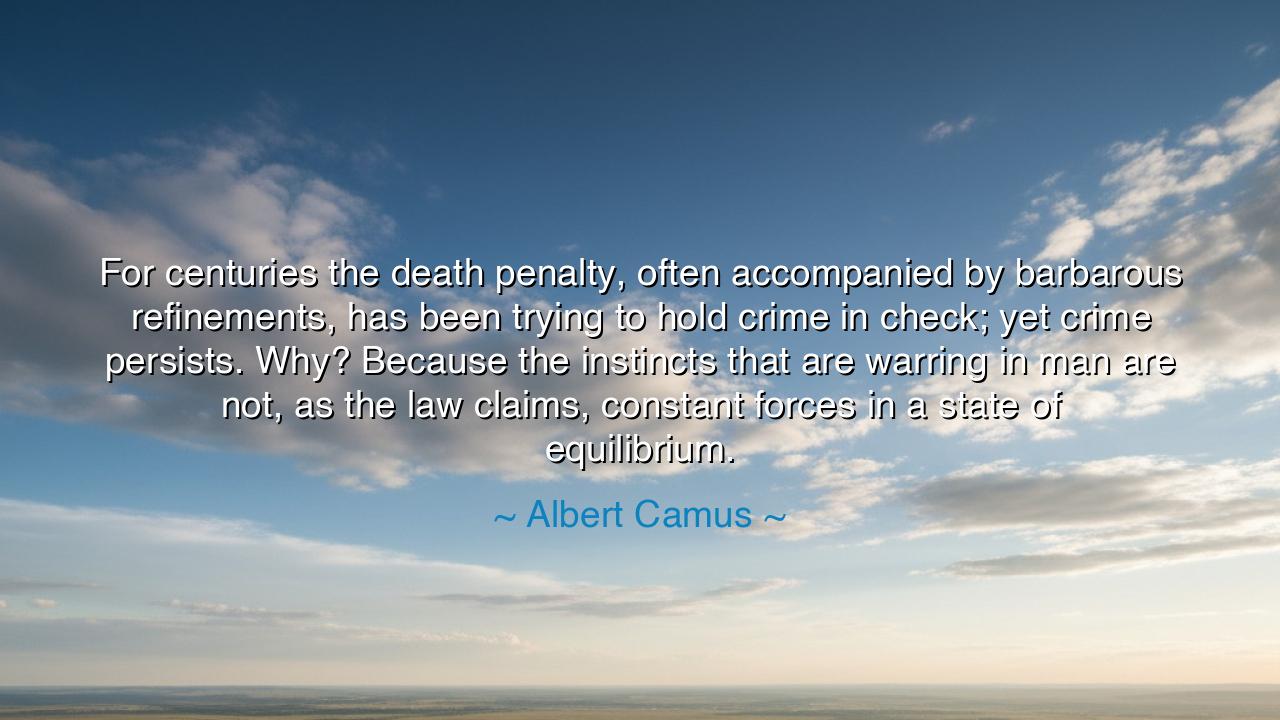
For centuries the death penalty, often accompanied by barbarous
For centuries the death penalty, often accompanied by barbarous refinements, has been trying to hold crime in check; yet crime persists. Why? Because the instincts that are warring in man are not, as the law claims, constant forces in a state of equilibrium.






"For centuries the death penalty, often accompanied by barbarous refinements, has been trying to hold crime in check; yet crime persists. Why? Because the instincts that are warring in man are not, as the law claims, constant forces in a state of equilibrium." Thus wrote Albert Camus, the philosopher of rebellion and conscience, whose pen carved truth from the contradictions of the human heart. In these words, Camus confronts the ancient illusion of authority—the belief that punishment can purify, that death can restore balance, that fear can erase the wildness within mankind. His wisdom pierces through centuries of blood and judgment to reveal a truth as haunting as it is liberating: the struggle between good and evil lives not in the courtroom, but in the soul.
Camus spoke as one who had walked through the ruins of a violent age. He had seen Europe torn apart by tyranny, execution, and war. He knew the futility of vengeance disguised as justice. For generation after generation, rulers and lawmakers believed that by spilling the blood of the condemned, they could cleanse society of its sins. The guillotine in France, the gallows in England, the crucifix in Rome—all were instruments of fear, built upon the belief that terror could tame the human heart. But still, as Camus observed, crime persists. The sword of justice has cut thousands of necks, yet never once has it cut through the root of human cruelty.
Why? Because, as Camus declares, the instincts warring in man are not fixed—they are storms, ever shifting, ever alive. Law imagines the human soul as a scale of reason and morality, balanced neatly between right and wrong. But the truth is more complex, more tragic. Within each person burns both the urge to create and the urge to destroy, both mercy and rage. These forces are not constant—they rise and fall with circumstance, with hunger, with love, with despair. The law, cold and rigid, cannot comprehend such movement. It strikes blindly, punishing the deed but never understanding the turmoil that gave birth to it.
Consider the story of Jean Valjean, the fictional hero of Victor Hugo’s Les Misérables. For stealing a loaf of bread to feed a starving child, he was condemned to years of hard labor. The law saw only the crime, not the man, not the hunger, not the soul in torment. And so it punished, but did not heal. The death penalty, Camus reminds us, is the ultimate expression of that blindness. It seeks to end crime by ending the criminal, as if human wrongdoing could be amputated like a limb. But crime is not a disease of a few—it is a symptom of all humanity. To kill one man for his darkness is to ignore the shadows that live in us all.
Camus’s philosophy springs from compassion joined with clarity. He does not deny that evil exists, nor that justice must act—but he calls us to a deeper wisdom: that to build a just society, we must first understand the chaos within ourselves. The instincts that lead to violence—fear, pride, envy, desperation—cannot be extinguished by execution. They can only be transformed by empathy, education, and equality. To punish without understanding is to fight a shadow with a sword; the shadow always returns, unchanged.
In his own time, Camus stood as one of the few who dared to oppose the death penalty openly. He argued that to kill in the name of law is still to kill, and that such killing teaches not reverence for life, but indifference to it. He believed that the moral progress of humanity begins when we refuse to imitate the violence we condemn. This idea, ancient in spirit, echoes the wisdom of the Stoics and the teachings of Christ: that mercy is stronger than retribution, and that true power lies not in taking life, but in protecting it.
So, what lesson shall we take from this? That no system, no government, no sword of justice can bring peace to a world still at war within itself. The battle against cruelty is not fought in prisons or courts, but in the hearts of men and women who choose understanding over hatred, compassion over fear. The next time we are tempted to judge harshly, to cast out or destroy what we do not understand, we must remember Camus’s warning: the human spirit is not a thing to be controlled—it is a sea, vast and shifting, capable of both storm and calm.
Therefore, my listener, walk with mercy. Seek justice, but never without humility. Condemn the crime, but never forget the man. For if we forget that all souls are bound by the same frailty, we will repeat the cruelty of the ages, believing we serve justice when we only serve our own anger. In the end, Albert Camus teaches that peace cannot be legislated—it must be cultivated—within the individual, within the conscience, and within the trembling, untamed heart of humankind.






AAdministratorAdministrator
Welcome, honored guests. Please leave a comment, we will respond soon